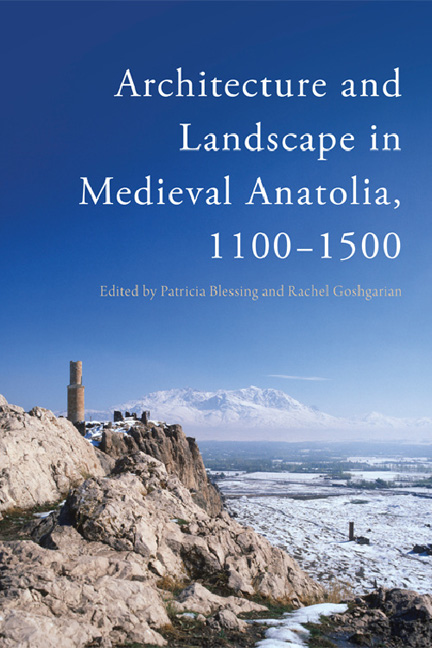Book contents
- Frontmatter
- Contents
- List of Illustrations and Tables
- Acknowledgements
- Foreword
- Map
- 1 Introduction – Space and Place: Applications to Medieval Anatolia
- Part I Building: Masons and Infrastructure
- Part II Social Groups: Akhis and Futuwwa
- 4 Suggestions on the Social Meaning, Structure and Functions of Akhi Communities and their Hospices in Medieval Anatolia
- 5 Social Graces and Urban Spaces: Brotherhood and the Ambiguities of Masculinity and Religious Practice in Late Medieval Anatolia
- Part III Exchange: Islamic and Christian Architecture
- Part IV Frameworks: Language, Geography and Identity
- Notes on Contributors
- Bibliography
- Index
5 - Social Graces and Urban Spaces: Brotherhood and the Ambiguities of Masculinity and Religious Practice in Late Medieval Anatolia
from Part II - Social Groups: Akhis and Futuwwa
Published online by Cambridge University Press: 03 January 2018
- Frontmatter
- Contents
- List of Illustrations and Tables
- Acknowledgements
- Foreword
- Map
- 1 Introduction – Space and Place: Applications to Medieval Anatolia
- Part I Building: Masons and Infrastructure
- Part II Social Groups: Akhis and Futuwwa
- 4 Suggestions on the Social Meaning, Structure and Functions of Akhi Communities and their Hospices in Medieval Anatolia
- 5 Social Graces and Urban Spaces: Brotherhood and the Ambiguities of Masculinity and Religious Practice in Late Medieval Anatolia
- Part III Exchange: Islamic and Christian Architecture
- Part IV Frameworks: Language, Geography and Identity
- Notes on Contributors
- Bibliography
- Index
Summary
The history of thirteenth-century Anatolia can probably best be visualized via contemplation of its robust construction projects. The caravanserais, madrasas, churches, mosques and dervish lodges that were built under Armenian, Byzantine, Georgian, Mongol and Seljuk rule altered cityscapes and landscapes from Ani to Konya, and from Trabzon to Antalya. Hence, these construction projects altered physical space and the ways in which people on the ground both conceived of and experienced the places in which they lived. This is to say, that the visual language constructed in the thirteenth and fourteenth centuries – particularly in cities, where construction projects were very enthusiastic – was understood according to an individual's life experience. And there was a diversity of life experience in late medieval Anatolian cities. Trying to understand the intersectionalities and liminalities of these structures can help us to better understand the ways in which social spaces were constructed and experienced in medieval Anatolia, and can illustrate how late medieval Anatolians lived in landscapes that were home to places (both physical and social) profoundly marked by ambiguities and inconsistencies.
While each of the structures present in medieval Anatolian cities is most commonly associated with a particular type of activity, scholarship has begun to uncover the myriad ways in which these medieval structures were used by a range of communities or social groups in Anatolia. At the same time, in a century marked by regional political competition, urban landscapes were increasingly used as stages where various groups engaged in competitive practices that sought to legitimise their approaches to organisation and power. In the fourteenth-century hagiography of Mawlana Jalal al-Din Rumi (d. 1273) and his family, Shams al-Din Aflaki (d. 1360) describes an interaction between Seljuk Sultan Ala al-Din Kayqubad (d. 1237) and Baha ad-Din Walad (d. 1231) upon the latter's initial arrival in the city of Konya, the place he would eventually call home.
Sultan Ala al-Din offered his hospitality by inviting the religious scholar to stay in his palace. Baha ad-Din (the father of Mawlana) refused, saying:
A madrasa is appropriate for imams, a khanaqah for shaykhs, a palace for commanders, a caravanserai for merchants, lodges (zaviya) for the rogues (runud) and the mastaba [bench] for foreigners.
- Type
- Chapter
- Information
- Architecture and Landscape in Medieval Anatolia, 1100-1500 , pp. 114 - 132Publisher: Edinburgh University PressPrint publication year: 2017



